Welcome to British Columbia (Canada) Road Lines & Pavement Markings
Understanding road lines matters; not only to be able to pass pesky tests to get your driver’s license and resultant freedom, but also to, you know, stay out of trouble while you are driving, and get from A to B in one piece.
In this guide, we’ll dive into the road line meanings from a beautiful British Columbia (Canadian) perspective. For similar articles, check out my epic article about the Road Signs of Canada or How to Drive Defensively and Prevent Collisions.
Road Lines Introduction
- Yellow road lines are used to separate traffic moving in opposite directions
- White lines are used to separate traffic moving in the same direction
Yellow Road Lines Separate Traffic Moving in Opposite Directions
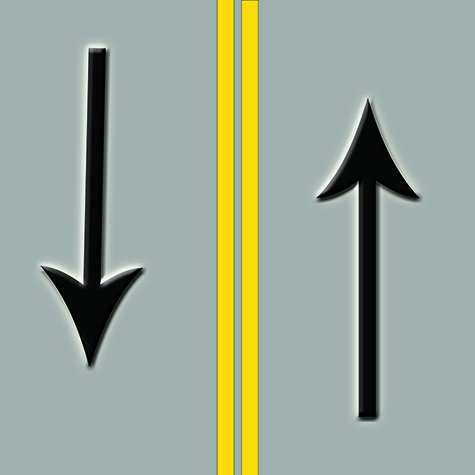
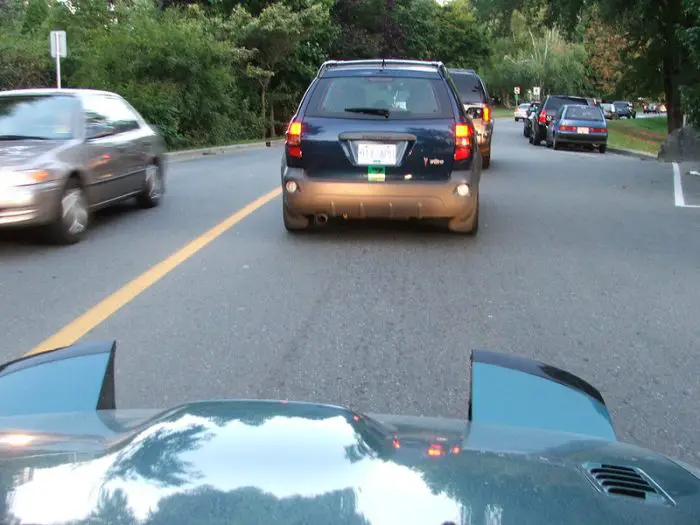
White Road Lines Separate Traffic Moving in the Same Direction
White lines – separating traffic traveling in the same direction – can be found on:
- One-way streets
- Freeways
- Highways
- HOV Lanes
- Multi-lane roads

The Yellow Road Line Should Always Be To Your Left
This is a generalization of course. But it’s true, that unless you are passing, or crossing this line to turn left, it should be to the left of you.
That’s how you know you’re on the “right” side of the road. Literally.
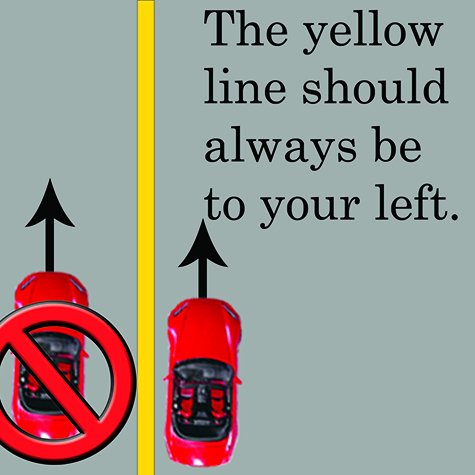
This Jeep here (pictured below) is totally on the wrong side of the road. But hey let’s look at the bright side, at least it stopped at the red light; that does count for something if you ask me.
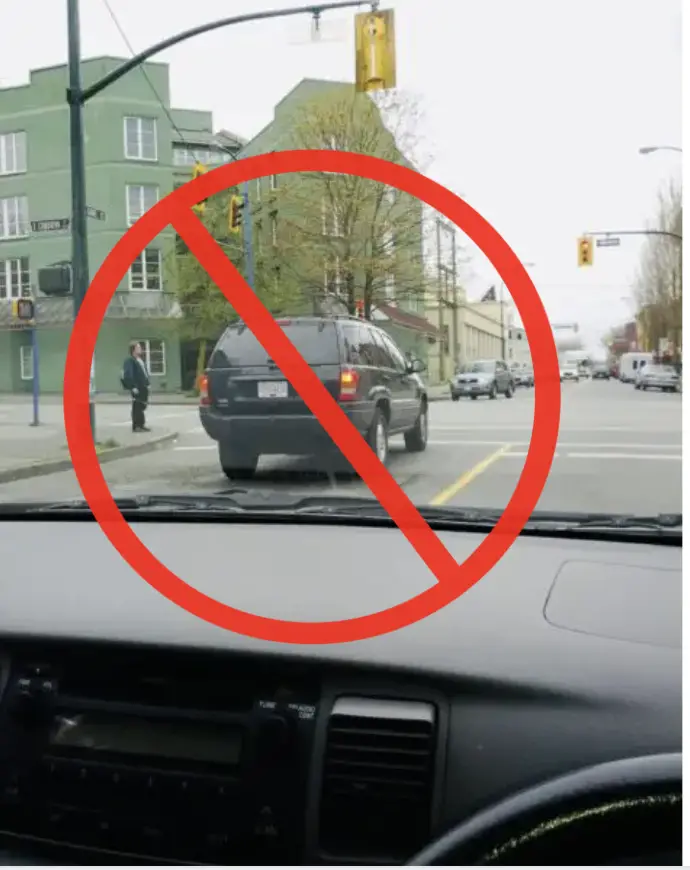
White Road Lines – Broken/Dashed
Awe, broken lines? We’re all a little broken, aren’t we? Oh never mind, I will speak for myself…
Broken, also known as dashed or dotted white road lines, mean that you’re allowed to change lanes when it’s safe.
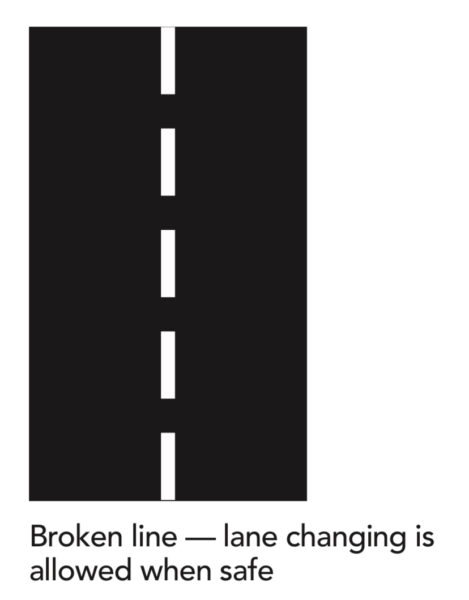
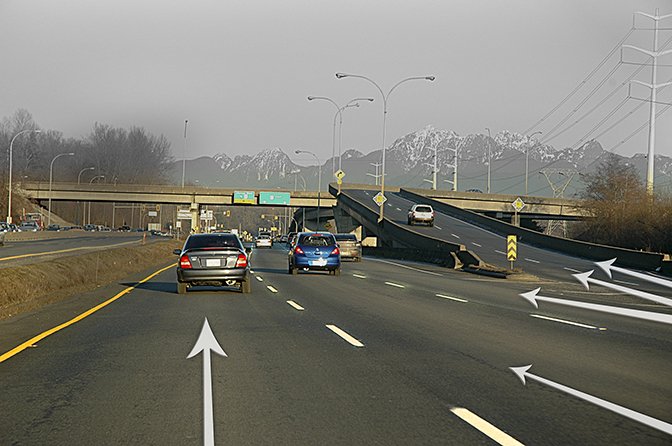

White Road Lines – Solid White Lines
Solid white road lines simply mean: Do not change lanes. As a reminder, white lines separate traffic moving in the same direction.
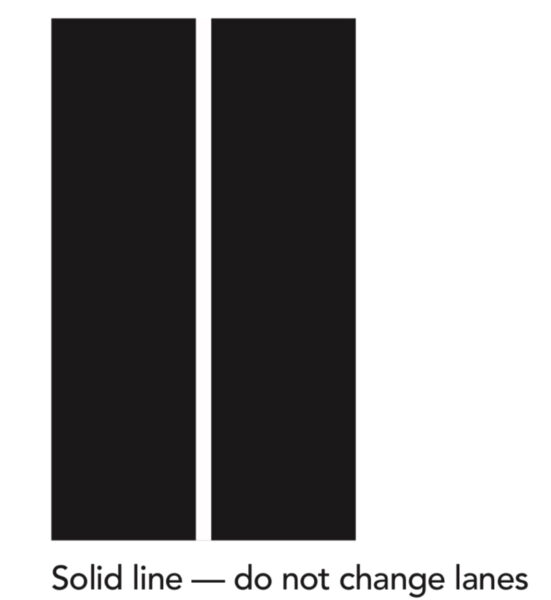
Changing lanes in the middle or before an intersection is dangerous, so these lines are here discouraging the action. And since you’re wondering, changing lanes in an intersection is not technically illegal in British Columbia because there is no law written against it; but of course, that’s no good reason to do it.
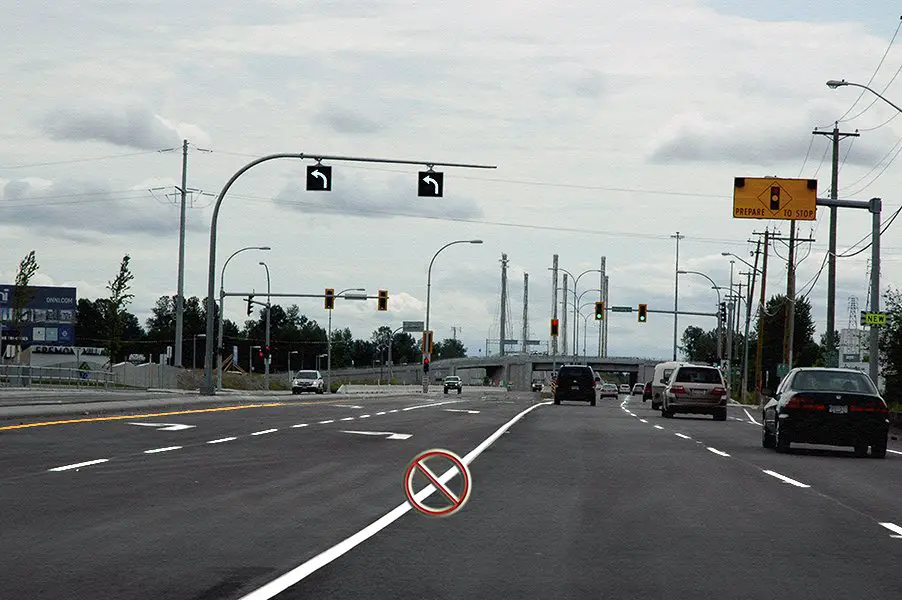
White Lines – Speed Reduction Markings (also known as Optical Speed Bars)
Question: What are those short white lines drawn perpendicular to the yellow line on the road?
Speed reduction markings are situated across lanes on the road; stripes are spaced at gradually decreasing distances. The idea for using them is to increase drivers’ perception of speed. The goal is to get drivers to reduce their speed.
As the spacing between the bars gradually narrows, drivers sense they have increased speed. This – in theory – will cause them to slow down to keep the same time between each set of bars.
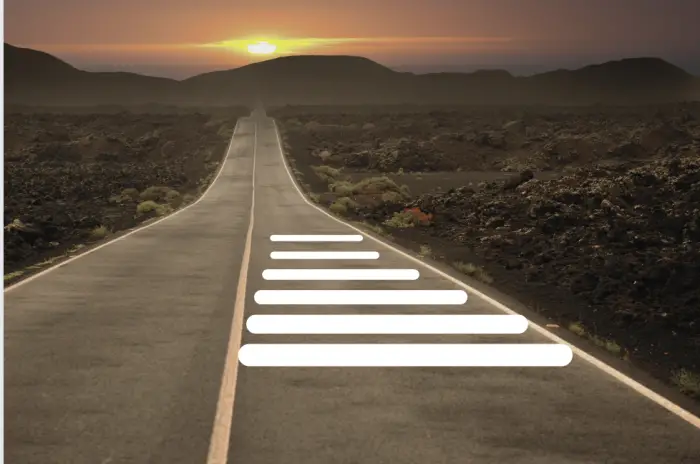
Yellow Road Lines – Single Solid Line
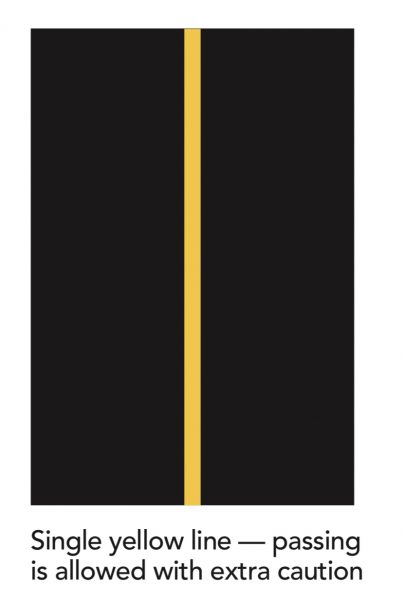
If you’re driving on a highway or road and you have only one solid yellow line, you are allowed to pass another vehicle at your discretion.
A lot of people seem to think passing isn’t allowed, but it’s technically allowed over one solid line. You can also turn left across this line into a driveway, lane, parking lot, or somewhere else.
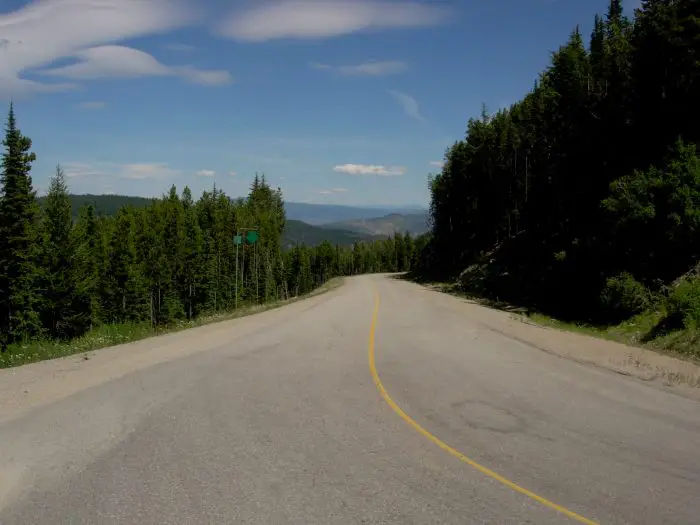
Yellow Road Lines – Broken/Dashed Lines
Passing is allowed over these broken yellow lines.
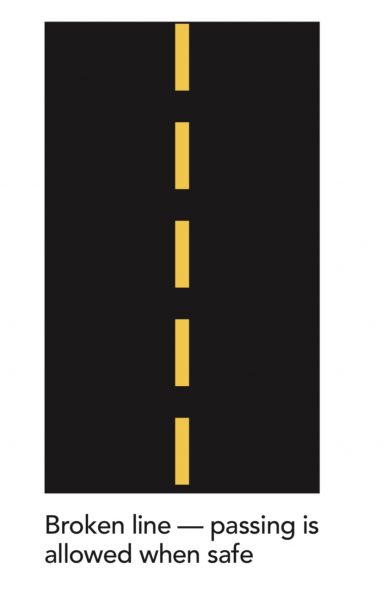
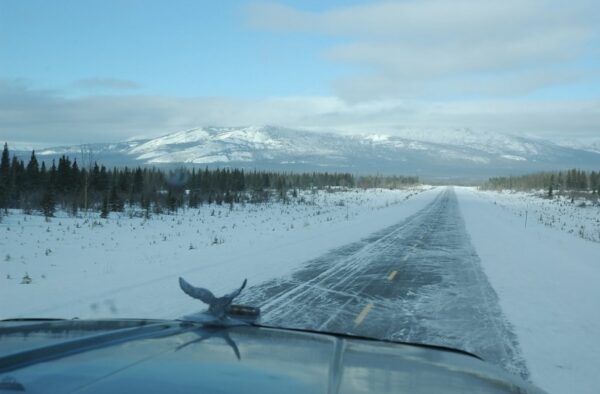
Yellow Solid Road Lines – Double Solid Yellow Lines
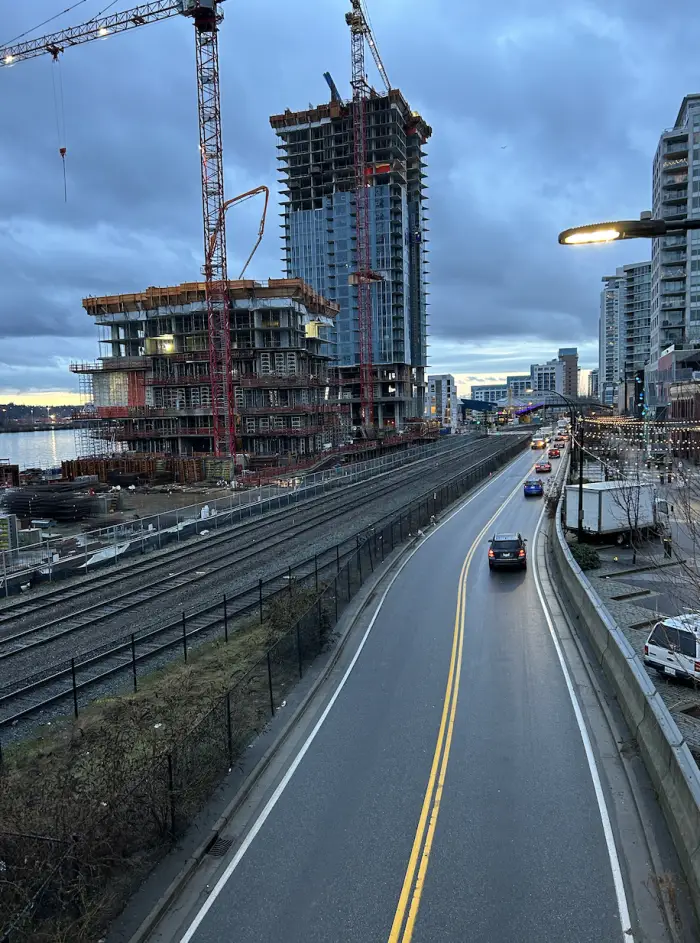
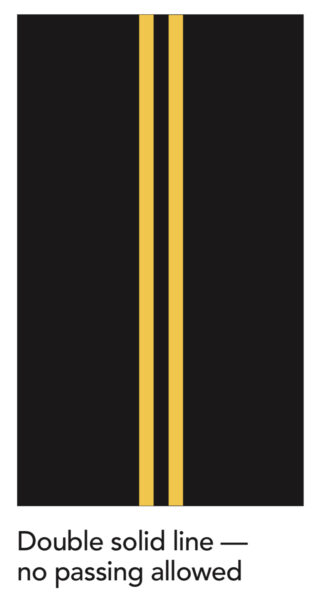
Double solid yellow road lines are where it is positively illegal to pass another vehicle.
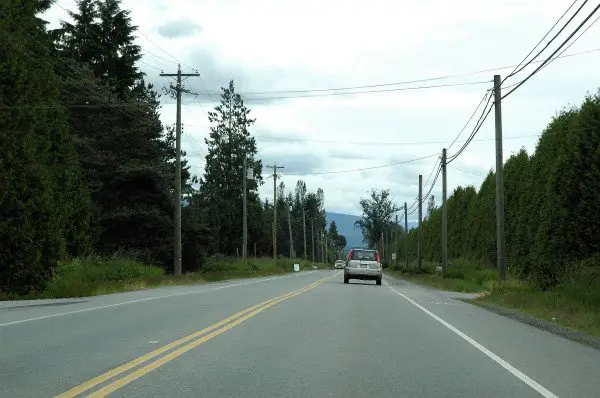
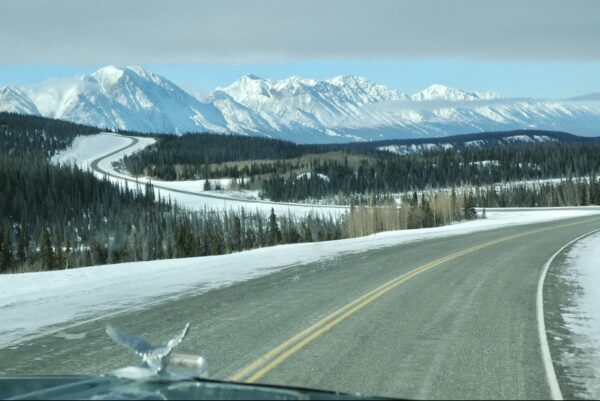
Yellow Road Lines – Solid Yellow Road Line With a Broken Yellow Road Line
If the solid road line is closest to you, it is illegal for you to pass
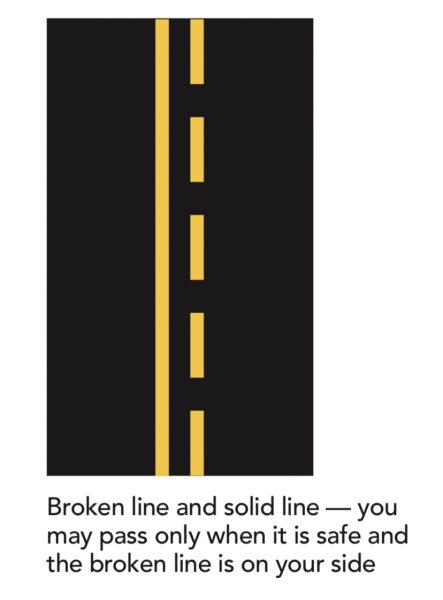
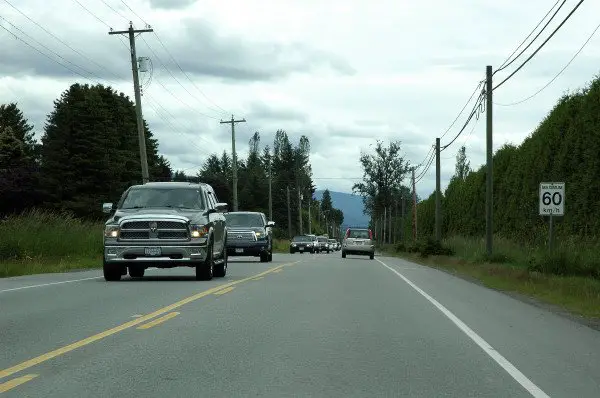
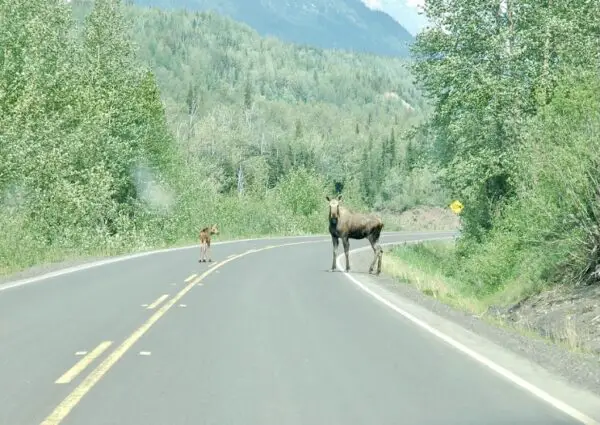
Yellow Road Lines – Double Yellow Broken Road Lines
A lane surrounded by yellow broken lines is reversible.
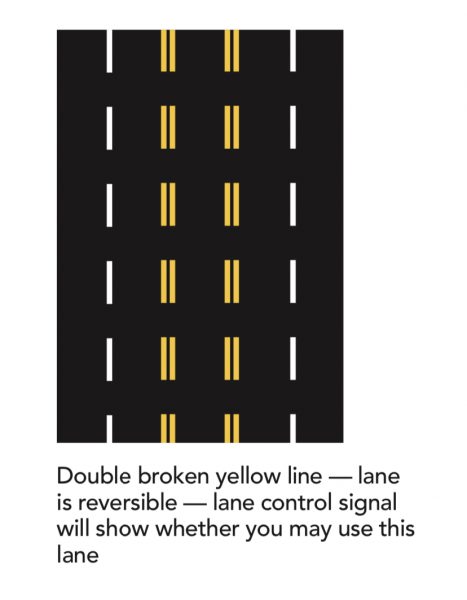
Drivers must watch for overhead signals to determine direction. These are a bit less common than the other types of road lines.
Lane Control Signals
Here are the lane control signals that go together with the reversible lane, almost like wine and cheese. They will be posted above the reversible lane.
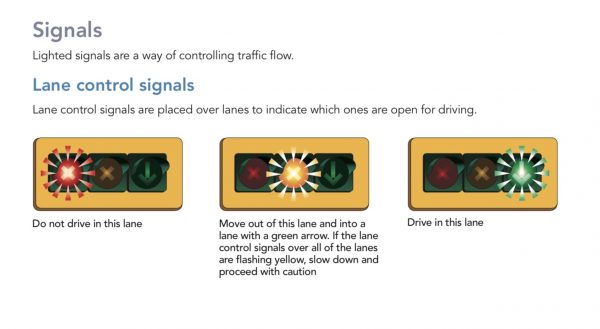
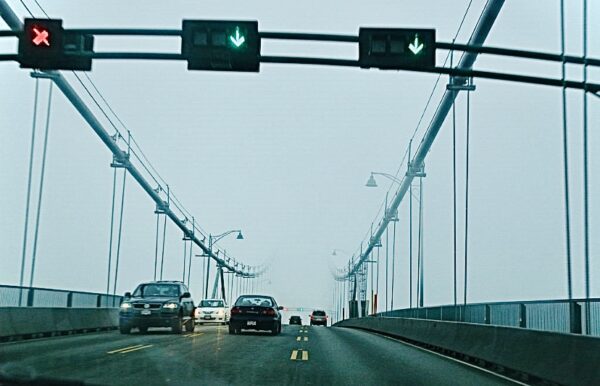
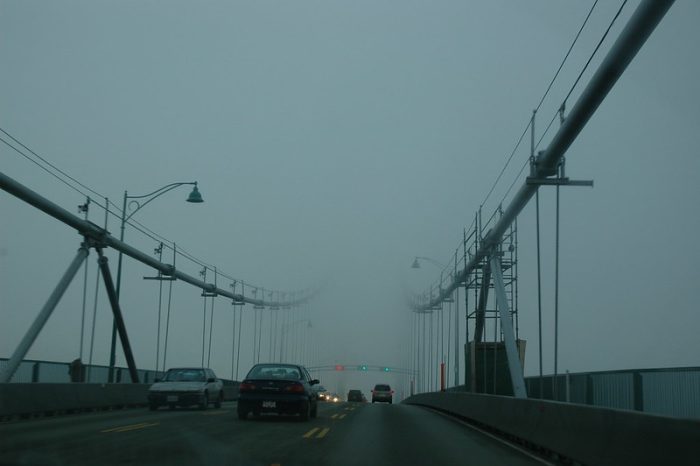
Two-Way Left Turn Lane
This is another somewhat uncommon lane. It’s a shared left-turning lane. So, drivers in both directions can use this lane to turn left.
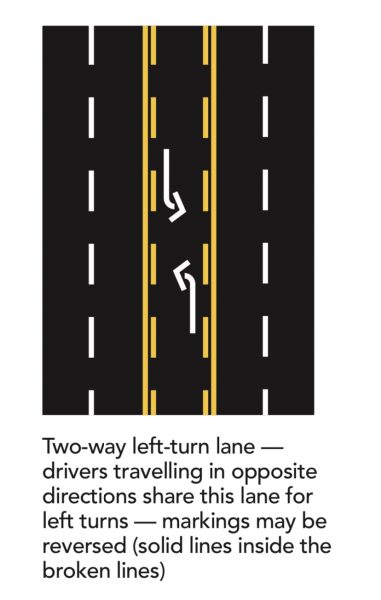
White Stopping Lines
This is commonly seen at crosswalks and at stop signs, reminding drivers to stop. It may or may not always have a stop sign with it, but it means stop nonetheless.
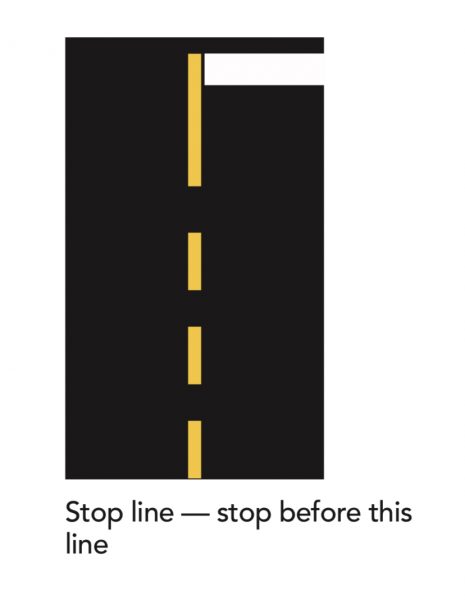
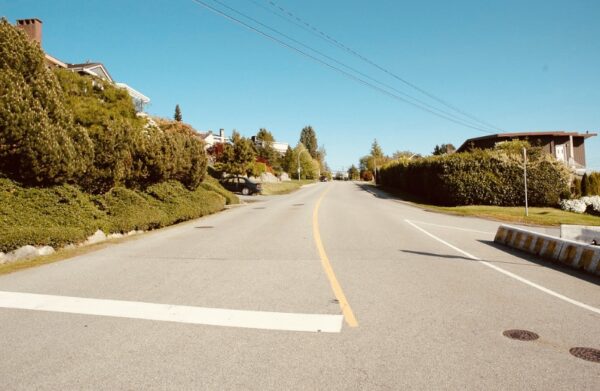
Pavement Markings – Crosswalks
There are several different designs for crosswalks. In any case, drivers must yield to pedestrians in the crosswalk.
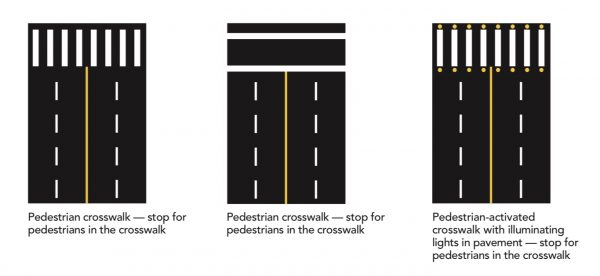
Pavement Markings For Turns
These pavement markings mean that you must go in the direction of the arrow.
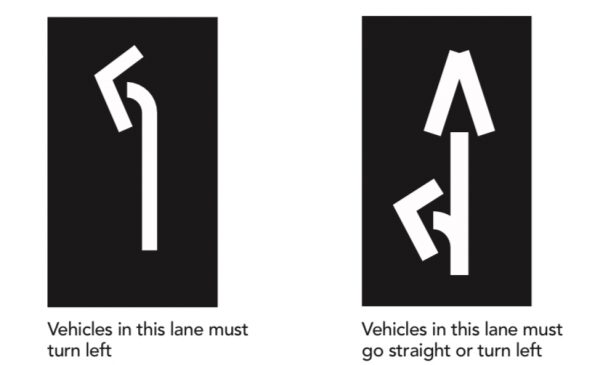
Since these are pavement markings, sometimes you can’t see them because, well, there are vehicles stopped on top of them. This happens when waiting for a red light, for example.
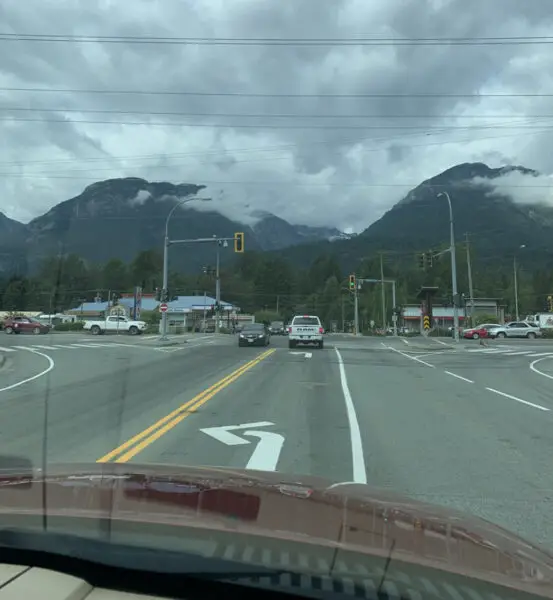
In that case, you can look above you or around you for the equally informative lane use signs; which, let’s be honest, you kinda should be looking for anyways.
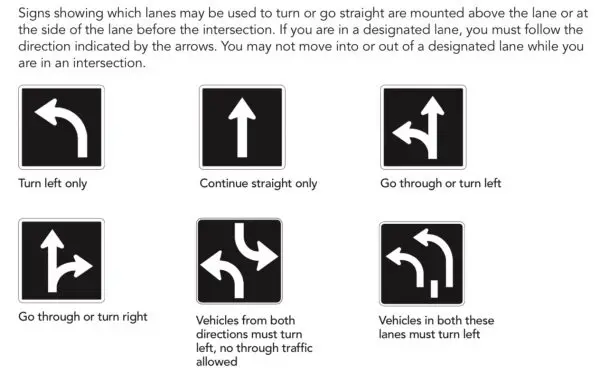
Pavement Markings – Painted Island

We are not supposed to drive on painted islands.
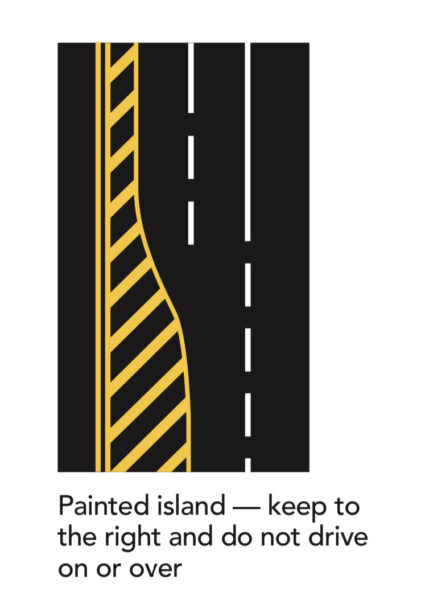
Reserved Lanes (HOV – High Occupancy Vehicle)
HOV or high occupancy vehicles can use these lanes, as well as buses, motorcycles, and cyclists; some lanes even allow electric vehicles. Check for signs and markings that let drivers know who can use the lane, and when.
General cars aren’t allowed in the lane unless there is a sign indicating the times.
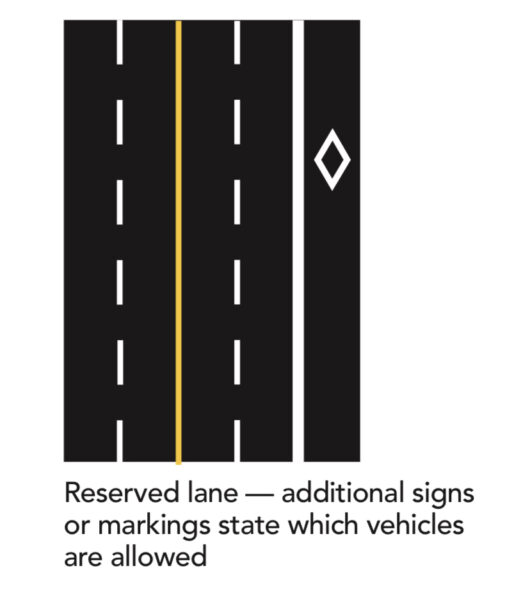
Bicycle Lanes
Bikes must travel in the same direction as the vehicles on their side of the road.
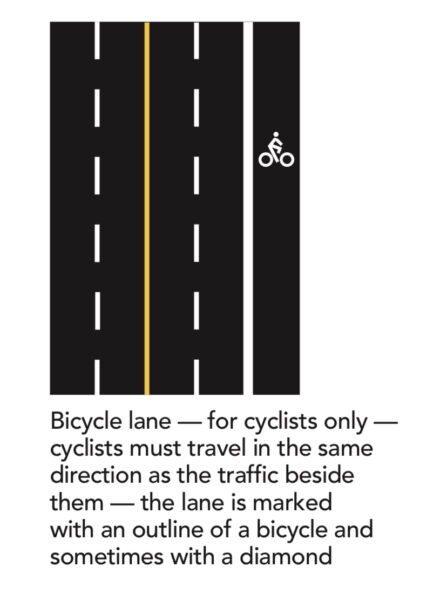
Pavement Markings – Pop Quiz
How Can Pavement Markings indicate that you are driving in the right direction?
Pop Quiz! If you are driving on this one-way ramp and you see these lines, which direction should the car be going? Is it traveling toward us or away from us?
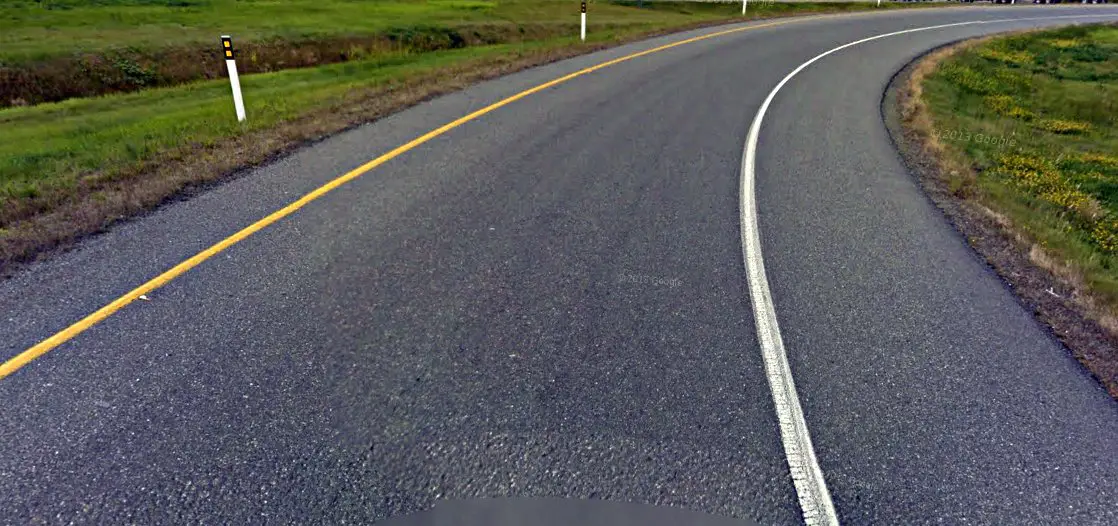
If you guessed this way, then you’re correct
Remember that the yellow road line should be on your left. If the yellow line is on your right, then you’re on the wrong side of the road.
This is how pavement markings can indicate that you are driving in the right direction.
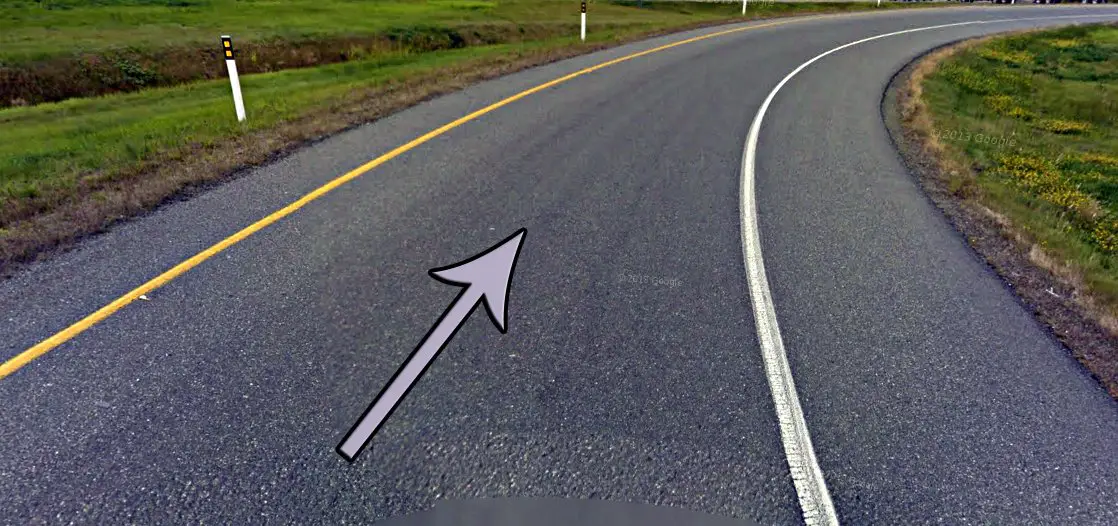

Lines on Private Property
Please note that on private property these guidelines may differ. For example, there might be a white line separating traffic moving in opposite directions (normally we would expect a yellow line for this).
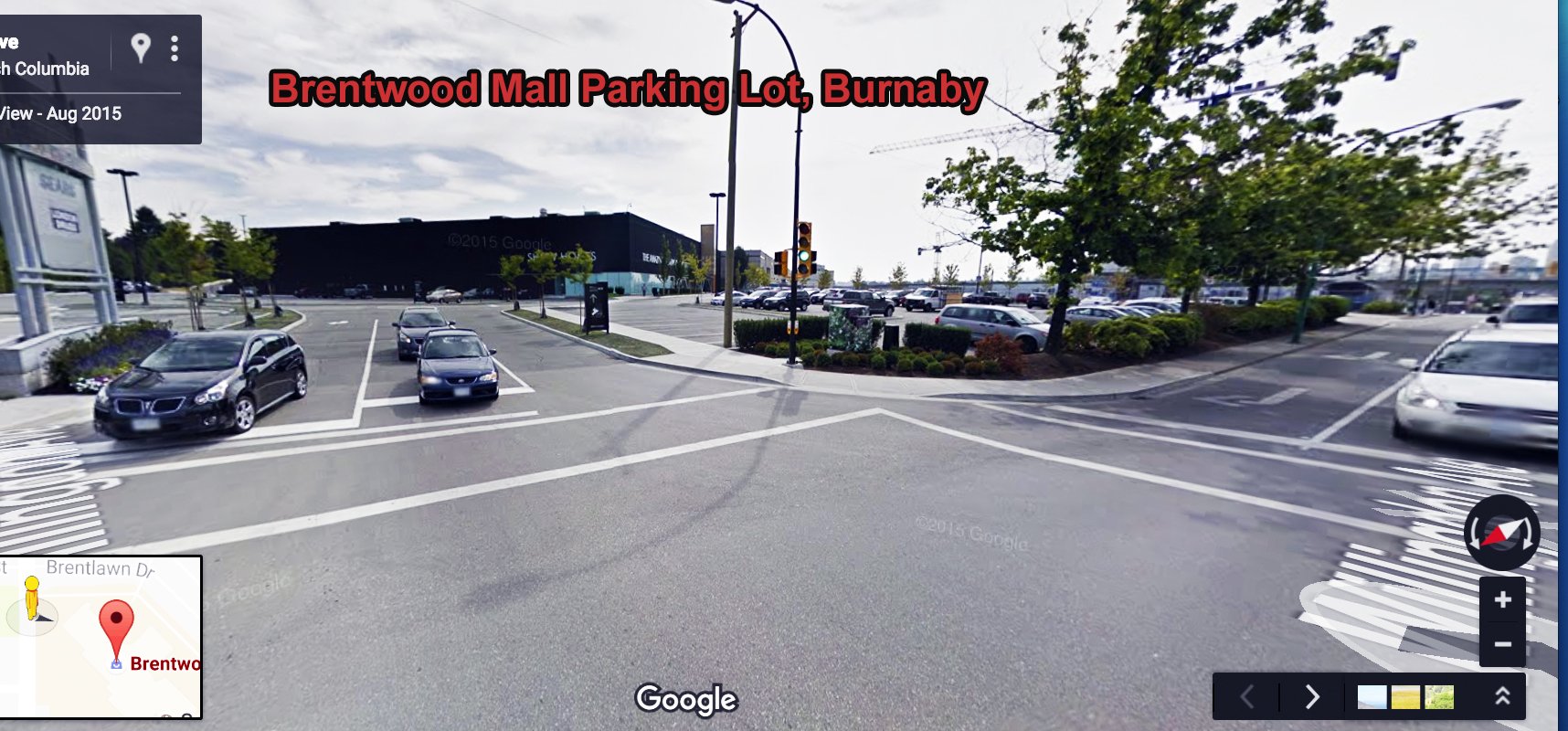
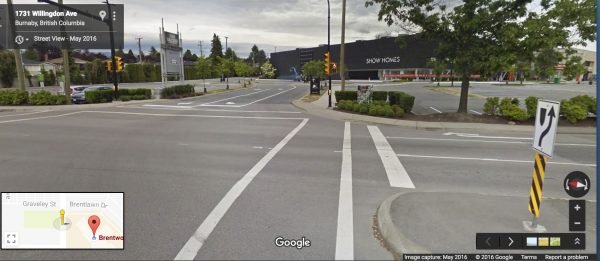
Carmen Cohoe
Carmen became a driving instructor in beautiful North Vancouver at the age of 22 due to some crazy people who agreed to hire her. After that, there was never a dull moment teaching many different folks from many different places how to drive using automatic and standard vehicles and a minivan.



Driving on divided highway I had to stop because the vehicle ahead of me came to an abrupt stop
There were four vehicles
I pulled over to see why I had to stop
A deer had ran accross the road
But the vehicle in front was still sitting there blocking the highway with four or five
Vehicles all stopped in a row
I signaled to the left after I had made a full
Stop
No vehicles were approaching me from the
Opposite derection
AI blew my horn repeatily as I slowely passed the cars that were blocking the highway
There wasn’t even a deer in sight when I got to the head of the line up
But I did cross a solid yellow line with a
spotted yellow line on the other side of th solid one
My horn as blowing as I safely went past the four car lineup
I read that if I came to a complete stop and then proceeded with upmost caution
But I got a ticket from RCMP
For crossing that line
Am I guilty of that offence
I am 73 with a clean driving record
Thanks
Hello Barry. Sorry to hear this. If the solid line was closest to you, it would be a violation to cross that line.
Is it legal to enter and leave the HOV lane on Highway 1 over the solid white line?
Hi. No, it’s illegal to cross the solid white line.
It’s really interesting to learn about the process for lines marking. I was surprised to read some of the equipment that’s necessary for marking lines. When I was reading through this, I expected to see a road marking machine, but I didn’t know that gas, rope, chisels, traffic lights, cleaning equipment, and small tools would be used for this process. Thanks for posting this http://www.brighterlines.com
I was traveling on a highway in Nevada, I was behind a semi going 55mph in a 70mph zone. I noticed it was safe to pass (someone in front of me just did this as well) so I started to pass the semi, about 3/4 of the way passing the semi the dotted line changed to solid and I continued to pass the semi and pass safely infront of the semi. I got pulled over from a trooper sitting on the hill saying I passed in a solid area that I was suppose to slow down and get back behind the semi. I told the officer/trooper I was almost pass the semi when the dotted line changed to a solid. I looked in the drivers manuals pages for Nevada but nothing says my scenario. Seems like I was singled out for something near a small town with out of state plates on my vehicle. Can anyone show me where this is illegal? My violation says passing on a solid yellow no pass zone. Which again nothing says dotted line passing that turned to solid line 3/4 of the way pass a semi.